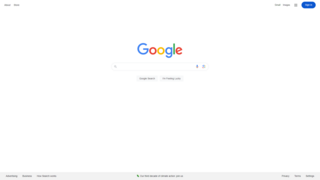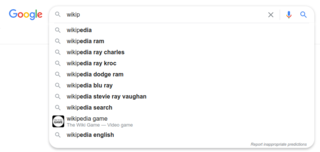Related Research Articles

Google Search is a search engine operated by Google. It allows users to search for information on the Internet by entering keywords or phrases. Google Search uses algorithms to analyze and rank websites based on their relevance to the search query. It is the most popular search engine worldwide.
Spamdexing is the deliberate manipulation of search engine indexes. It involves a number of methods, such as link building and repeating unrelated phrases, to manipulate the relevance or prominence of resources indexed in a manner inconsistent with the purpose of the indexing system.
WebCrawler is a search engine, and one of the oldest surviving search engines on the web today. For many years, it operated as a metasearch engine. WebCrawler was the first web search engine to provide full text search.

robots.txt is the filename used for implementing the Robots Exclusion Protocol, a standard used by websites to indicate to visiting web crawlers and other web robots which portions of the website they are allowed to visit.
A web directory or link directory is an online list or catalog of websites. That is, it is a directory on the World Wide Web of the World Wide Web. Historically, directories typically listed entries on people or businesses, and their contact information; such directories are still in use today. A web directory includes entries about websites, including links to those websites, organized into categories and subcategories. Besides a link, each entry may include the title of the website, and a description of its contents. In most web directories, the entries are about whole websites, rather than individual pages within them. Websites are often limited to inclusion in only a few categories.
Search engine optimization (SEO) is the process of improving the quality and quantity of website traffic to a website or a web page from search engines. SEO targets unpaid traffic rather than direct traffic or paid traffic. Unpaid traffic may originate from different kinds of searches, including image search, video search, academic search, news search, and industry-specific vertical search engines.
Internet research is the practice of using Internet information, especially free information on the World Wide Web, or Internet-based resources in research.

Excite is an American website operated by IAC that provides outsourced internet content such as a metasearch engine, with outsourced weather and news content on the main page. As of 2024, all of Excite's operations are controlled by services outside of the business.
Jew Watch was an antisemitic website promoting Holocaust denial and negative claims about Jews. The claims included allegations of a conspiracy that Jews control the media and banking, as well as accusations of Jewish involvement in terrorist groups. The site contained propaganda, according to Sam Varghese of The Age, similar to that used in Nazi Germany. It was widely considered a hate site. Jew Watch received support from Stormfront, a white nationalist and neo-Nazi site. The site described itself as a "not-for-profit library for private study, scholarship, or research [that keeps] a close watch on Jewish Communities and organizations worldwide".

The yellow pages are telephone directories of businesses, organized by category rather than alphabetically by business name, in which advertising is sold. The directories were originally printed on yellow paper, as opposed to white pages for non-commercial listings. The traditional term "yellow pages" is now also applied to online directories of businesses.
Affiliate marketing is a marketing arrangement in which affiliates receive a commission for each visit, signup or sale they generate for a merchant. This arrangement allows businesses to outsource part of the sales process. It is a form of performance-based marketing where the commission acts as an incentive for the affiliate; this commission is usually a percentage of the price of the product being sold, but can also be a flat rate per referral.
Yahoo! Search is a search engine owned and operated by Yahoo!, using Microsoft Bing to power results.

A search engine is a software system that provides hyperlinks to web pages and other relevant information on the Web in response to a user's query. The user inputs a query within a web browser or a mobile app, and the search results are often a list of hyperlinks, accompanied by textual summaries and images. Users also have the option of limiting the search to a specific type of results, such as images, videos, or news.

Mahalo.com was a web directory and Internet-based knowledge exchange launched in May 2007 by Jason Calacanis. It differentiated itself from algorithmic search engines like Google and Ask.com, as well as other directory sites like DMOZ and Yahoo! by tracking and building hand-crafted result sets for many of the currently popular search terms.

The history of wikis began in 1994, when Ward Cunningham gave the name "WikiWikiWeb" to the knowledge base, which ran on his company's website at c2.com, and the wiki software that powered it. The wiki went public in March 1995, the date used in anniversary celebrations of the wiki's origins. c2.com is thus the first true wiki, or a website with pages and links that can be easily edited via the browser, with a reliable version history for each page. He chose "WikiWikiWeb" as the name based on his memories of the "Wiki Wiki Shuttle" at Honolulu International Airport, and because "wiki" is the Hawaiian word for "quick".
In the field of search engine optimization (SEO), link building describes actions aimed at increasing the number and quality of inbound links to a webpage with the goal of increasing the search engine rankings of that page or website. Briefly, link building is the process of establishing relevant hyperlinks to a website from external sites. Link building can increase the number of high-quality links pointing to a website, in turn increasing the likelihood of the website ranking highly in search engine results. Link building is also a proven marketing tactic for increasing brand awareness.

DMOZ was a multilingual open-content directory of World Wide Web links. The site and community who maintained it were also known as the Open Directory Project (ODP). It was owned by AOL but constructed and maintained by a community of volunteer editors.

Blekko, trademarked as blekko (lowercase), was a company that provided a web search engine with the stated goal of providing better search results than those offered by Google Search, with results gathered from a set of 3 billion trusted webpages and excluding such sites as content farms. The company's site, launched to the public on November 1, 2010, used slashtags to provide results for common searches. Blekko also offered a downloadable search bar. It was acquired by IBM in March 2015, and the service was discontinued.
Jasmine Directory is a human-edited web directory providing websites and businesses categorized topically and regionally. It offers thirteen topic-based categories and one region-based category with hand-picked and reviewed users' suggested resources. Jasmine Directory was founded in 2009 by Pécsi András and Robert Gomboș and is headquartered in Valley Cottage, New York. It won eight prizes during 2013–14 for its editorial discretion and manually added resources. Jasmine Directory proved to be useful for SEO Google search results since they manually add about 90% of the resources.
References
- ↑ Wasserman, Noam; Uy, Antony (September 10, 2008). "Frank Addante, Serial Entrepreneur". Harvard Business Review . Retrieved June 19, 2010.